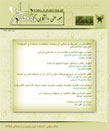فهرست مطالب

مجله منهاج
پیاپی 9 (پاییز و زمستان 1388)
- تاریخ انتشار: 1391/06/12
- تعداد عناوین: 8
-
-
صفحه 5
-
صفحه 151
-
Page 7In three lectures given by Dr Sediqeh Vasmaqi in January and February 2010 under the title of «The Relationship between Jurisprudence and Sunnah» some important points were raised. Besides concepts such as «sunnah» and «hojjiyat», these lectures dealt with some basic doctrinal principles like «definition and states of messengership» and «the position of caliphate» above «jurisprudence». Most of what these lectures tackled requires serious criticism. What made the author of the present article criticize these lectures is introduction of the speaker as a PhD holder in «Jurisprudence and Principles of Law» which gives her in the sensitive position of an educator and adds to the sensitivity of the point under question.Keywords: sunnah, messengership, caliphate, Qadir, hojjiyat (authority), osveh (model), balaq (communication)
-
Page 49The world and the Hereafter and the relationship between the two is among the most important issues raised in Islamic teachings including those offered by Quran and hadith. Since the beginning of the emergence of Islam, Islamic scholars, including the commentators of the Quran, hadith scholars, preachers and researchers, have always dealt with this issue. A major part of the highly valued Nahj-ol-Balagheh has also been allocated to this theme. In this article, the researchers aim at finding and introducing the relationships that are evident in the language of Imam Ali (a.s.) and that of the Holy Quran. We have categorized and presented a summary of the themes in Nahj-ol-Balagheh related to "the world" and "the love of the world" and then compared them with what the Quran says in this respect.Keywords: secularity, the world, the hereafter, real asceticism, monasticism, adornment of the world, encouraging, intimidation
-
Page 69Continuation of life and man’s growth and development depend upon communication. Communication behavior takes different forms in human societies, but adoption of the most desirable form is of great significance. Divine prophets who are models and guides for man utilized the most desirable form of communication behavior in their interactions as a result of which the hardest and darkest hearts of disbelievers and the misled were softened. Devine prophets never used arrogant and coercive behavior with others; rather, reverence for human beings derived from man’s nature made the core of their behavior. Divine prophets never forgot the human self-esteem and were never unaware of human dignity under the most difficult circumstances and even when they were faced with their enemies, because their ultimate desire was not to dominate others; rather, they had a more sublime purpose. They never agreed with humiliation and debasement of their communities and human beings and always sought the growth and excellence of others so that they could accomplish their divine mission.Keywords: communication behaviors, successful communication, decisiveness, reverence, prophets
-
Page 85Family has been the earliest, most important and bountiful social institution during the history of human culture and civilization. This institution is the best setting for maintaining human dignity and providing for the security and mental tranquility of the family members, developing a new generation, socializing children and meeting the needs of people. Promotion of the prayer culture in society is one of the most important duties of all those involved in education of children, adolescents and the youth; and it is the most fundamental duty of family. Therefore, it is necessary for them to attract these groups towards prayer by making use of careful and comprehensive planning specifically developed for each age group. Today, the youth are inflicted with mental and emotional problems and a variety of moral anomalies which are all the outcome of negligence and weakness of faith. Hence, prayer can help the youth find tranquility of heart and gain happiness in this world and salvation in the hereafter.Keywords: prayer, family, training, the youth, the Quran, hadith
-
Page 105One of the key issues related to Hazrat Mahdi’s (aj) emergence is the establishment of his universal government. It is obvious that the best and most complete plan for creating a single worldwide government is only possible under the auspices of the government of Imam Mahdi, the savior of all human community. Therefore, it is necessary to explain different features and scope of such a government. The present study examines this issue on the basis of Islamic texts.Keywords: Hazrat Mahdi (a.s.), universal government, features, scope
-
Page 131Intellect is the most basic cognitive asset of man which is even the basis of the authority of revelation. Wisdom together with its intrinsic authority is in need of Imamate and guidance of true knowledge or revelation. Servanthood of God is only possible in light of intellect and following the Quran and Etrat (the Descendents of the Prophet) and intellect leads us to know the Quran and Etrat. Therefore, knowing the Imams is also the outcome of intellect. This article examines intellect in two parts. In the first part, the position and significance of intellect and its perfection are deliberated upon from the viewpoint of the Quran, and in the second part, the pathology of intellect together with some relevant practical formulas are presented.Keywords: the Quran, Etrat (the Descendents of the Prophet), perfection of intellect, pests of intellect
-
Page 151There is a world between the present world and the Hereafter called Barzakh which is the home for the souls of all human beings until the day of Resurrection. The Holy Quran says: “.. . and before them is a barrier until the day they are raised”. (XXIII, 100) This word has been used three times in the Quran: in XXIII, 100, LV, 20 and XXV, 53. It has reported in a narration from the Holy Prophet (p.b.u.h.) that (barzakh) is a tomb or garden from the gardens of Paradise or it is a hole from the holes of Hell.Keywords: Barzakh, the world of grave, Alame Mesal (the world of Ideas), body in Barzakh, body in the world of Ideas

